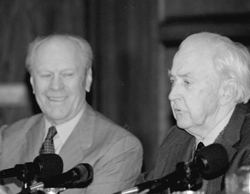By Mary Jo Frank
Office of Communications

A flood of grisly images from Southeast Asia flashing on American’s nightly television news in the late 1960s and early 1970s sapped support for a failing war.
“When public support eroded, Congress wasn’t there. The impact was devastating,” former President Gerald R. Ford recalled, speaking at a panel discussion about politics and media at the April 7 conference “After the Fall: Vietnam Plus Twenty-Five.”
“I’m not sure American public opinion will ever support another war if they have to see it on television,” said Jim Cannon, former Newsweek correspondent and panelist.
Media coverage of Vietnam was strikingly different from that of World War II, when the government and press were allies in what was seen as a “necessary and just war,” Cannon explained. When he covered the Korean War for the Baltimore Sun, Cannon said, the alliance was beginning to give way to skepticism for reporters who listened to Gen. Douglas MacArthur say the Chinese were not coming into Korea when they knew otherwise.
“By Vietnam, the two former allies [the U.S. government and the press] had become not just adversaries, but almost enemies,” Cannon added.
Haynes Johnson, who served in the Army during the Korean War and later won a Pulitzer Prize for his reporting of the Civil Rights Movement, originally favored U.S. intervention in Vietnam, but changed his mind after covering Southeast Asia for two years.
The United States had to withdraw from Vietnam because the public no longer would tolerate the never-ending casualties, Ford said, and when the North Vietnamese violated the terms of the cease fire agreements formally signed in Paris and overwhelmed South Vietnam, Americans concluded they had had enough.
Panel moderator and CNN “Reliable Sources” co-host Bernard Kalb showed Ford a photograph of White House correspondent Helen Thomas chasing Ford across a tarmac on April 29, 1975, the day the United States evacuated the last Americans from Saigon. Remembering the moment and how he watched reports of the helicopter evacuation from the Oval Office, Ford recalled, “It was terrible to know we were getting a real military licking.”
Commenting on the panelists’ observations that it is difficult for the government to conduct a war when media are opposed, Ford noted that sometimes the U.S. press ignores wars. Today 21,000 U.S. military personnel are in the Persian Gulf and aircraft are bombing Saddam Hussein at a cost of $3 million a day, Ford said. The situation in Iraq is being ignored by the news media, he charged.
“We’re now in an all-Elian [Gonzalez], all-Monica [Lewinsky], all-O.J. [Simpson] world,” said Johnson, who asserted that the press is a mirror of society. Society, he said, is focusing on minutiae and scandal rather than politically significant stories. As authors of the first drafts of history, journalists need to strive to make sense of events, Johnson asserted.
The Pentagon has concluded from Vietnam that it can’t let journalists and camera crews close to the war front and still conduct a war, said Cannon, citing the Gulf War as an example where the government successfully controlled press access.
Former Sen. Eugene McCarthy, a longtime friend of Ford and early opponent of U.S. involvement in Vietnam, compared the media’s self-analysis of its Vietnam War coverage to monkeys in a zoo. “Every once in a while they engage in a bout of self examination. It doesn’t do any harm, and it makes them feel good,” McCarthy said.
Ford did not blame the press for the way it covered Vietnam, acknowledging that reporters had no alternative if they were to maintain their integrity. For almost 50 years, the United States was engaged in the Cold War with the Soviet Union. During that period, “the public supported our efforts against the Soviet Union and the press gave the government a fair shake. We ended with a very successful conclusion. The press did an objective job, the public supported it and we won,” Ford said.

